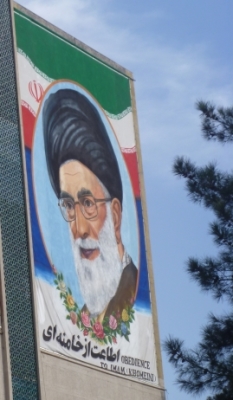“Do you believe in evolution?” This has to be one of the most annoying questions about evolution out there. To see why, have a look at this 1hr talk by Josh Roseneau about what Miss USA can teach us about evolution. For the meaty part, see below where he plays a compilation of every single contestant answering whether they believe evolution should be taught in schools:
There were a handful of decent answers. But the vast majority of contestants framed belief in evolution as if it were a personal choice. It’s as if you go to the supermarket and there’s a shelf with packets of evolution and packets of creationism and you can just pick one to your satisfaction: Coke or Pepsi? (To be fair, perhaps that type of answer might have been the best strateBy international standards, Iran is one of the most politically-repressive countries in the world, coming in at 175 out of 179 on the Press Freedom Index for example. However, it appears to have more dissent than the countries that score similarly on the index. The world saw a bit of that in the 2010 election (although portraying it as the Green Revolution and focussing on Twitter in the international media was misleading). What I experienced was that many people were eager to say something. When one couple from our group was hanging out at the artists’ centre in Tehran, the first thing one student asked was “what do you think of the mullahs?”.
The freedom problems the people face are very serious. This is often played up in the media in terms of how it relates to foreigners or executions of locals for (say) adultery. In these cases, it’s common to underreport the most prevalent problem which is usually the large-scale detention and torture of people. One couple saw a man being arrested by the police in Shiraz. They said they’ve never seen anyone look more terrified, and that he really struggled from their grip even though it was futile. Of course we don’t know anything about this case. But as is common in probably 50 other states, torture was a real possibility.
Tourists are monitored. I believe Australians needed to be on a group tour with an itinerary approved in advance, although this might be wrong. A lot of Europeans can travel independently — we met a French couple in East Azerbaijan who just drove in from Turkey with their kids. When there is a US citizen in a tour group, things change. The guide must be have a special license to lead groups with US citizens and must report on what happened every night. Our guide said this was not because they’re afraid of spying since a competent spy will not have the passport of the country he/she is spying for anyway. Rather, it’s the concern that if anything happens to the US citizen, there will be more international relations problems for Iran. Which makes a lot of sense from their perspective. In practice, it’s quite hard for a US citizen to get in as they don’t grant too many visas and it depends a lot on the current foreign relations temperature.
There is still an indoctrination in the ideology of the Islamic Revolution that was hard to fathom. This building-size poster that I saw in Isfahan was particularly jarring. (Transcript: “Obedience to Khamenei is Obedience to Imam Khomeini” with a picture of both men.) For this poster to be effective requires a radically different political reality compared to anything I’ve experienced. Forget western democracies, I think even a citizen of a fairly repressive country wouldn’t be able to read that and not laugh or cringe. The blend of revolutionary radicalism with messianic theology is pretty unique.

We went to the former US embassy which has been a headquarters to the Revolutionary Guard since it was taken over in 1979. It’s huge, taking up an entire gated city block with the inside being almost like a university with different buildings, campuses and parking lots. The outside is famous for its anti-Western murals, which I was too cautious to get a good photo of because the surrounding streets are full of cameras and heavy monitoring. It was the only explicitly anti-US, anti-West and anti-Israel images I saw in Iran.

An interesting thing I learned is that religious minorities have some parliamentary representation. Out of 290 seats, there is a total of 14 for Jews, Zoroastrians, Armenians, Assyrians and Chaldeans. These 14 seats represent approximately 175000 people or 1 seat per 12,500. This makes them actually over-represented in parliament compared to the wider Shiite population by a factor of 20. (According to my calculations, the other seats represent an average of 271,000 each).
On the other hand Bahai (the other major religion) is outlawed entirely. The notion of what it’s like to be a member of a religious minority in Iran is complex. People often like to make this stuff up to back up their particular views. For a reasonably good article on Jews in Iran, see here (hat tip Simon Holloway).
Learning about Iran and going to Iran are exercises in dealing with complexity and mass-scale biases. I now see so many opinions on Iran as a case of the Dunning Kruger effect. Namely, it’s someone who’s so ignorant they actually think they know a lot — or enough to voice an authoritative opinion. But some things are clear — for instance the desire of many Iranians to be more accepted and less misunderstood (from their perspective). “Are you afraid of Iran?” a woman in asked as inside an Isfahan shrine. I’m not sure how much irony she was intending but I’m still reeling from that question.
gy for winning Miss USA so it’s not an indictment on the contestants.)
This would be similar to other questions like “do you believe in qi/god/global warming/the safety of GMOs?” The first annoyance is of course to frame it as a belief, making it more like a personal preference rather than something based on evidence. The second is to turn it into almost a consumer item. The third is that this almost assumes that these beliefs should be and are picked because of what they can do for us: “Do you choose to believe in evolution, or does creationism tend to fulfil your needs better?”
But the biggest problem I find isn’t the “believe” or even the “choose to believe” but the inclusion of “you” in the first place. This frames us as being the pivotal points of the controversial issue at hand, when we’re really not. This then makes it a lot easier to get into personality analysis: what is it about you that caused you to make this belief choice. As an example, I was discussing qi and the fact that I didn’t “believe in qi” suddenly made it about me. Whereas I didn’t ask to be part of this, I’m more interested in the lack of evidence for qi as a genuine (non-metaphorical) thing.
One way that’s been suggested to stop framing belief as personal choice is to say something like “I accept evolution”. This is a little better, but it still makes it about us. “The scientific community accepts evolution” — that’s a bit better but long-winded. It might work for other cases. For example, saying that I believe that GMOs are safe wouldn’t have much weight, but if I said that in academia there is broad consensus on safety, perhaps that might be more effective.
Maybe one way to get rid of belief-talk is simply to say “do you think that X?” For instance, “I think that evolution happened”. This sounds similar but doesn’t seem to have the same connotation as belief, maybe because thinking something highlights the actual process and not the fact that The Consumer Has Chosen. And then we can get to the actual content, which is where things should be.





0 Comments